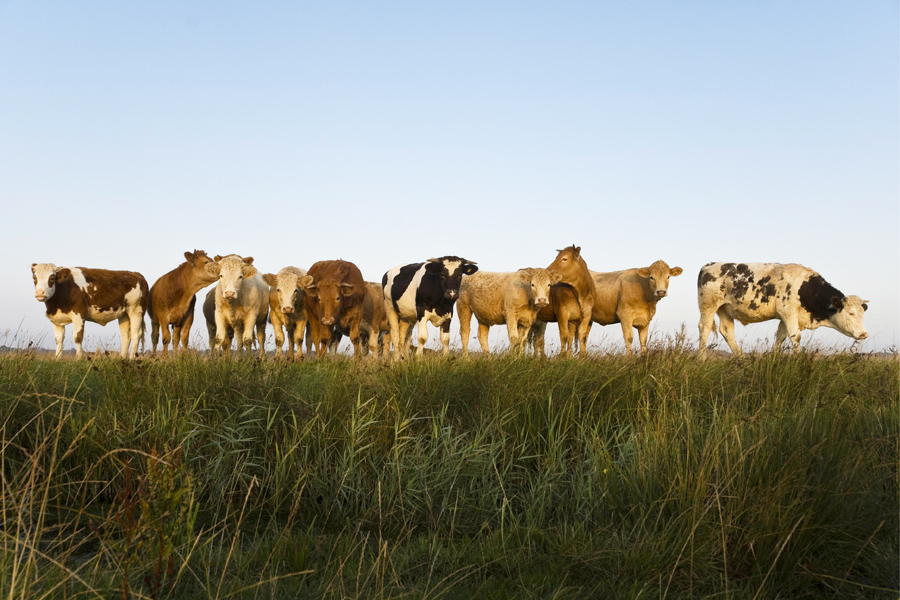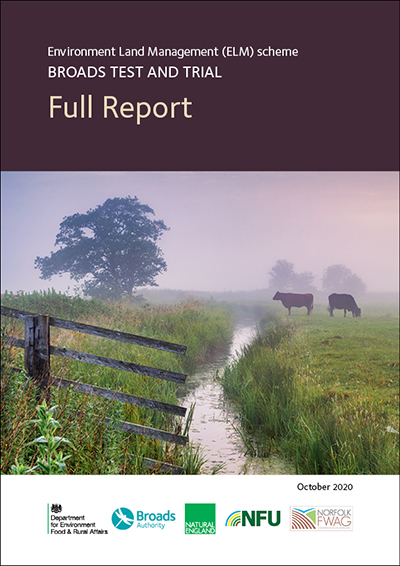Schemes that reward environmental benefits
Defra is currently developing its vision for agricultural policy post Brexit that will help to deliver the Government’s ambition to leave our environment in a better state than we found it.

Basic Payment Scheme and Countryside Stewardship will be replaced with a system of public money for public goods - the ‘Environmental Land Management scheme’ (ELMs).
To encourage co-design and appropriateness of the new scheme, Tests and Trials are being run for collaboration between farmers and land-managers. Tests will help design some of the fundamental building blocks of the post-Brexit agricultural policy including how scheme participants plan and record which public goods they will deliver. Public goods include clean and plentiful water, clean air, thriving plants and wildlife, reduction in and protection from environmental hazards, adaptation to and mitigation of climate change, beauty, heritage, and engagement with the environment.
Trials will make sure any interventions and innovations work before they are applied across the country. Tests and trials will not analyse methods of delivery of environmental outcomes, including payments, but will run alongside the national pilots.
The Broads is one of the nine of England’s National Park Authorities that are currently involved in running Tests and Trials as part of this process. This page includes a summary of Broads program.
Please contact Andrea Kelly on Andrea.Kelly@broads-authority.gov.uk should you wish to learn more.
What’s new:
The full test and trial report and Action Plan submitted to Defra, and Broads Tier Structure are essential reading to gain farmer and land manager views about the Schemes that reward environmental benefits.
It is great news that we have been granted a second Broads Test and Trial by Defra operating up to August 2021, to investigate the following areas:
- Development of a Broads Land Manger Board and running seminar sessions to develop local prioritisation
- the role of a local convenor and a local delivery board in new scheme delivery
We believe advice provision is front and centre to a good schemes
Our online surveys are now closed, but you can still view two presentations that were designed to help complete the surveys:
- presentation one is about the latest thinking from farmers and land managers about ideas on how collaboration and a Local Delivery Board might work
- presentation two provides information on the draft Broads tier structure, payments and monitoring verification work.
Free one to one advice:
Free one to one advice is available until the end of March 2021. The Broads Authority are working with Norfolk FWAG, NFU and Natural England/Defra to offer free one to one advice and support to help you enhance the environment as part of a sustainable business. Advice is aimed at understanding the advantages of taking up a simplified Countryside Stewardship agreement now, ahead of the launch of new Scheme in 2024. This includes access to a long-term source of income for providing environmental benefits as BPS payments reduce.
Details can be found in the Stewardship advice leaflet (PDF).
Summary
The two Broads Test and Trial are:
- Developing local prioritisation principles.
- Investigating the payments and management interventions that deliver public goods as well as monitoring and verification of these interventions.
- Assessing how further farmer collaboration might work in the Broads and structures to support local working together to benefit our area, businesses and the environment.
Key Partners are:
- Natural England
- National Farmers Union
- Norfolk Farming and Wildlife Advisory Group
- A wider steering group of farmers, reed cutters and nine land management organisations
- Defra
Timescale:
We have completed a series of workshops, online survey and one to one discussions from November 2019 and have to reported to Defra in October 2020 and are due to report about the second Test and Trial in August 2021.
Anticipated Outcomes:
Farmers and land managers have:
- Improved understanding of relevant public goods for the Broads.
- Identified the appropriate management interventions that deliver priority public goods, helped create a tier structure for the Broads wetland habitats and explored the basis of payments that would be most effective.
- Discussed how the interventions will be monitored, recorded, and verified and tested an early self-assessment process for fens.
- Identified the expert support structures needed locally for the Schemes, testing the concept of a Broads Land Management Board to provide local prioritise, advice and oversight.
- Identified the interventions that could be made across multiple holdings and discussed how a bonus system could encourage and support the delivery of public goods at a landscape scale.
- Investigated the role of a local convenor and a local delivery board in new scheme delivery.
Progress so far
October 2019: Defra awarded the Broads Authority a Test and Trial contract. Sub-contracts awarded to Natural England, Norfolk Farming Wildlife Advisory Group and facilitator.
13 November 2019: First partnership workshop with 63 farmers and land managers explored what worked well and could be improved with previous agri-environment schemes and what a future scheme for the Broads might look like.
Read the Workshop report.
December 2019 - March 2020: Met with five farmer groups, one land manager group and two reed cutter and grower groups to help develop management interventions and costs, monitoring and verification, farmer collaboration and structures to support local working together in the Broads.
2020 workshops cancelled due to Covid-19 so we have changed the project to be online.
The Broads surveys (survey one and survey two) are designed to ‘test’ the various ideas which have been refined through discussions with farmers and land managers.
July 2020: Presented Broads T&T results to Defra and range of other T&T participants during a Defra webinar
October 2020: Reported our results to Defra and presented ideas for future work and recommendations
- Read the full ELMs report, Action Plan and the Broads Tier Structure
October 2020: Extension of Broads T&T to look at advice provision in the scheme, which we believe is front and centre to a good ELM scheme and the role of a local convenor and a local delivery board in ELM scheme delivery.
February 2021: Second Test and Trial awarded to the Broads Authority. Set up Broads Land Management Board and testing with 3 seminars to assess local prioritisation. The Seminar topics are:
- Natural Capital: suitability of existing mapping and data to aid ‘natural capital’ prioritisation. A review of existing mapping and a discussion about what information is required for effective prioritisation of habitat and biodiversity maintenance and improvement.
- The Longer Term View: speakers and presentations on ‘climate change adaptation’ focused around: peat, carbon and flood management strategy and how these might/should influence prioritisation.
- Other funding sources: private finance, blended finance and public infrastructure projects (i.e. IDB investment) and how these might be combined with and influence prioritisation.


